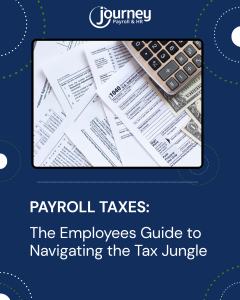Managing payroll taxes is a critical responsibility for employers, Ensuring compliance with various tax regulations can feel overwhelming, but understanding the different types of taxes and your obligations can help you navigate this complex landscape with confidence. Luckily, if you’re a client of Journey Payroll & HR, we’ve got your back on these tax obligations.
 Employer Payroll Tax Obligations
Employer Payroll Tax Obligations
Before processing payroll, it’s important to understand the taxes you’re required to manage.
Employers are responsible for several key payroll taxes:
- Social Security Tax: Employers match the employee’s contribution of 6.2% on wages up to the annual limit ($160,200 for 2025).
- Medicare Tax: Employers also match the employee’s contribution of 1.45% on all wages, with no income cap.
- Federal Unemployment Tax Act (FUTA): Employers pay 6% on the first $7,000 of each employee’s wages annually. However, this rate can be reduced to as low as 0.6% if timely state unemployment tax payments are made, qualifying the employer for a credit of up to 5.4% wages annually.
- State Unemployment Tax Act (SUTA): Rates and wage bases vary by state. In most states, only employers pay this tax, but some states require employee contributions as well.
While employers withhold federal income tax from employees’ wages, they do not contribute to this tax themselves.
Reporting and Depositing Taxes
Employers must deposit federal income tax and both the employer and employee portions of Social Security and Medicare taxes. The IRS requires these deposits to be made either monthly or semi-weekly, depending on the amount owed. In addition, employers must file quarterly reports using Form 941, detailing:
- Wages paid
- Taxes withheld
- Tax liability by quarter
Understanding and fulfilling your payroll tax obligations is essential for maintaining compliance and ensuring the financial health of your business. With the right tools, systems, and reliable support, navigating payroll taxes doesn’t have to feel like trekking through a jungle. Staying informed about tax regulations makes this complex task more manageable—and we’re here to help guide the way.